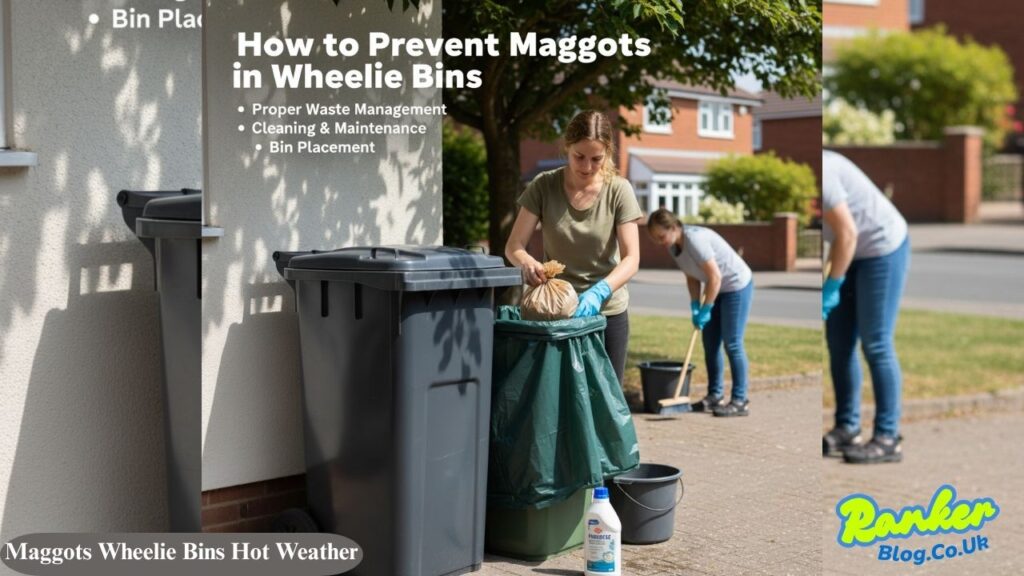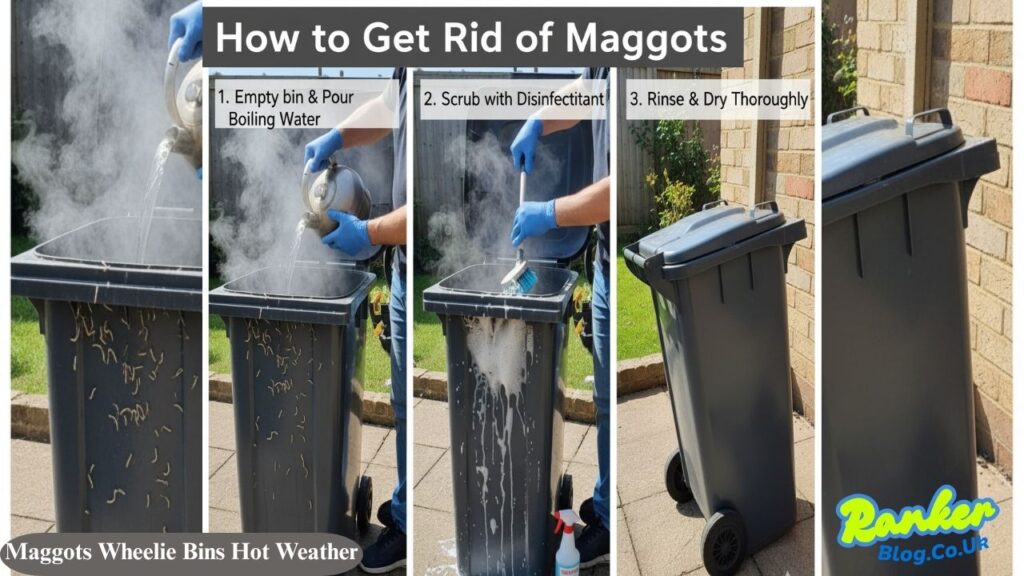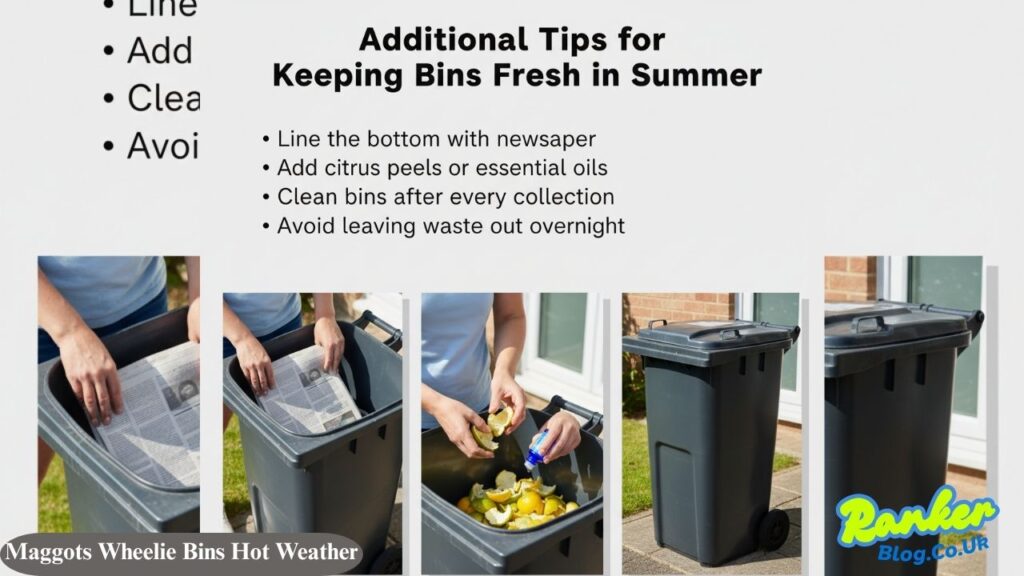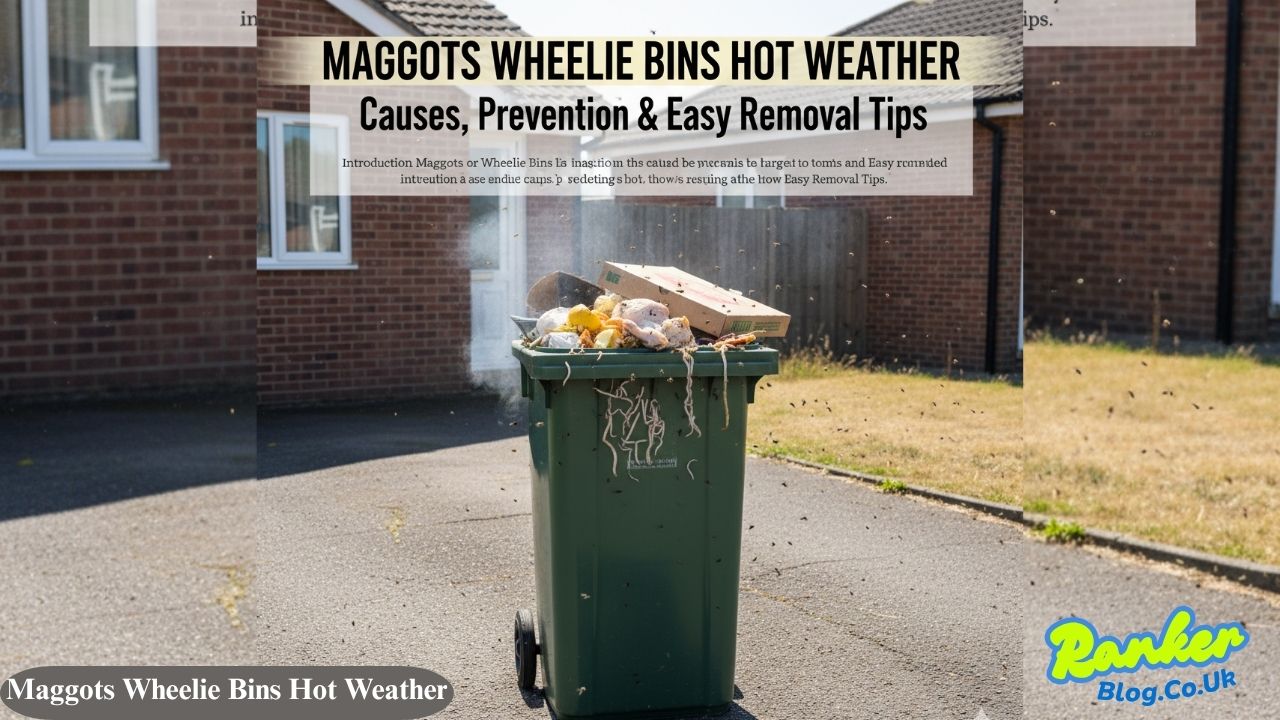Introduction
maggots wheelie bins hot weatherDuring summer, many households face the unpleasant sight of maggots wheelie bins hot weather problems. When temperatures rise, wheelie bins become a breeding ground for flies that lay eggs in food waste, quickly turning into maggots. The combination of leftover food, moisture, and heat creates ideal conditions for infestations.
This guide explains what causes maggots in bins, why they spread faster in hot weather, and how to get rid of maggots from bin effectively using simple household methods.
What Causes Maggots in Wheelie Bins?
Maggots appear when flies lay eggs on decomposing organic waste like meat scraps, fruit peels, or pet food. In maggots wheelie bins hot weather, this process speeds up significantly. The warmth and humidity inside bins help eggs hatch within hours.
Common attractants include food waste left unsealed, overflowing bins, or damp compost materials. Once maggots in bins start developing, they can multiply rapidly and cause strong odors that draw even more flies.
Why Hot Weather Makes It Worse
Flies reproduce faster in high temperatures, and so do maggots. The maggots in bin hot weather cycle continues because heat shortens the time it takes for eggs to hatch. A single fly can lay hundreds of eggs, and within a day or two, bins can become infested.
Bins left in direct sunlight retain heat, making conditions perfect for maggots in wheelie bin infestations. The stronger the smell, the more flies arrive to lay eggs.
How to Prevent Maggots in Wheelie Bins

4.1 Proper Waste Management
Prevention begins with how waste is handled. Always seal leftover food tightly before disposal. Use compostable bin liners or double-bag wet waste to stop flies from accessing it. Avoid throwing liquids or uncovered leftovers directly into the bin — this reduces the risk of maggots wheelie bins hot weather issues.
If you use hot compost bins UK or a hot compost bin UK, ensure the mix isn’t too damp to avoid attracting maggots.
4.2 Cleaning and Maintenance Tips
Regular cleaning keeps bins fresh. Using bleach and hot water kills both maggots and eggs. After washing, rinse and dry thoroughly to stop flies from breeding again. Natural cleaners like vinegar or baking soda also help reduce odors.
For households using an outdoor water bin, keeping it sealed and disinfected helps prevent cross-attraction of flies.
4.3 Bin Placement and Storage
To stop maggots in a wheelie bin, place bins in shaded areas where possible. Keep lids firmly closed and avoid overfilling. During collection days, make sure waste is picked up on time. A clean and shaded wheelie bin reduces both heat buildup and smell, limiting fly activity.
How to Get Rid of Maggots if They’ve Already Appeared

If maggots have already invaded, here’s how to get rid of maggots from bin safely:
- Empty the bin completely.
- Pour hot boiling water over the maggots (check how hot is boiling to ensure effectiveness).
- Scrub the surfaces with disinfectant or a vinegar-based solution.
- Rinse and dry before reuse.
Boiling water kills maggots instantly, breaking their life cycle. For persistent infestations, repeat cleaning every few days.
Natural Remedies vs. Chemical Cleaners
Eco-conscious homeowners can use natural remedies such as salt, lime, or vinegar. These are effective for small infestations. However, when maggots wheelie bin problems become recurring, chemical sprays or pest control may be needed.
Those using a hot bin composter can manage waste more efficiently while minimizing the chance of maggot formation.
Additional Tips for Keeping Bins Fresh in Summer

To maintain freshness:
- Line the bottom of bins with newspaper to absorb moisture.
- Add citrus peels or essential oils as natural repellents.
- Clean bins after every collection.
- Avoid leaving waste out overnight.
Even seeing images of a maggot can remind homeowners how quickly infestations happen — staying proactive is key.
When to Contact Local Council or Bin Services
If maggots return frequently, contact your local council or waste collection service. They may offer bin replacements or advice on handling maggots inside fly infestations. Councils in the UK often recommend hot compost bins UK to reduce fly breeding during summer.
Conclusion
Dealing with maggots wheelie bins hot weather problems doesn’t have to be difficult. Regular cleaning, sealing waste, and maintaining dry bins are simple yet powerful preventive measures. Knowing how to eliminate maggots early saves time, effort, and discomfort. With consistent care, your bins can stay fresh and maggot-free all summer long.
FAQs
How long does it take a maggot to hatch?
It can take less than 24 hours in warm, humid weather.
Can maggots spread diseases?
Yes, they can carry bacteria and contaminate nearby surfaces or items.
What’s the best disinfectant for bins?
A mix of bleach and hot water is effective for deep cleaning.
Should the bin lid stay open or closed in hot weather?
Keep it tightly closed to prevent flies from entering.
Also Read: Sodiceram Revolutionizing Modern Ceramics for Contemporary Spaces

